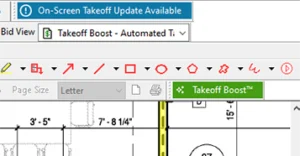As a construction professional, what kinds of goals did you set for yourself in 2019? Did you resolve to get a promotion or to take on more responsibility in your current role? As we round out this year and head into another, where do you stand with your goals? Whether you’re an estimator or a project manager, odds are you may need a bit of inspiration to get you over the finish line before setting new goals for 2020.
To help you finish your construction year strong, here are some strategies for effectively setting and achieving your most important goals.
Write Down Your Construction Goals
According to one university study, you are 42 percent more likely to accomplish your goals if you write them down. The mere act of committing them to paper (or, more likely, typing them into your phone) isn’t necessarily a game-changer. But when you do so, your mind can start to find clarity on what you want to do and exactly how you’re going to do it. In other words, it’s where you start to formulate your strategy.
For example, if your construction company has recently invested in new takeoff and estimating software and your goal is to learn how to use it, you should write down some ideas so you can establish a timeframe and a plan of action. Likewise, if you need to learn more about BIM or the latest advances in jobsite safety training, you should create a list and begin jotting down action steps about what those efforts would look like.
Your subconscious mind will then be able to lock onto the goal and provide some drive to make it a reality.
Look into the Future and Work Backward
As you write down your goals, you should begin to envision your life as if you’ve already accomplished them. For instance, what would you be doing differently as a senior estimator versus what you do now as a junior estimator? What additional skills would you need to acquire if you were to make a move into a project management role? Spend time getting a clear picture of the knowledge, skills, and abilities necessary to make such a change and then create a framework to make it happen.
Work backward from the achievement of the goal to now. For starters, what do you have to do in the next 90 days or even the next month to prepare yourself for a senior estimator position? Do you need to have a conversation with your current boss? Do you need to enroll in some online classes to further your skills in estimating or cost analysis? Set timeframes around your action steps so that you’ll have a roadmap to follow toward the future.
Review and Reset Your Habits
Another important aspect of goal setting is to examine your habits. There’s a chance that some less-than-ideal habits may hinder your efforts toward achieving key goals.
Of course, this type of self-reflection will likely require some unvarnished honesty—as well as a willingness to change what you identify as standing in your way. Still, making some critical changes will likely pay off in various ways in the long run, so this will just give you a head start.
Observe How Others Achieve Success
If you know someone who has already accomplished the goal you’ve set or are planning to set for yourself, you should try to talk to them about how they did it. For example, we’ve partnered with ASPE, the American Society of Professional Estimators, an organization that provides education, fellowship, and professional development for folks in the preconstruction industry.
ASPE members can attend regular chapter meetings in many locations across the U.S. to network with industry peers and get firsthand accounts of what steps helped facilitate a major career change or what skills paved the way for an expansion of someone’s current responsibilities. (If you’re interested in learning more about ASPE, click here.)
No matter how you do it, observing and (better yet) talking to someone who can help you see the road forward toward achieving your goal is going to be critical.
Hold Yourself Accountable
Many experts agree that another important component of achieving goals is holding yourself accountable. It’s true that being accountable to yourself can be a strong motivator. However, making yourself accountable to a friend, a spouse, or a trusted construction colleague is likely to increase both your motivation to move forward and your desire to do so.
In addition, it gives those you choose to confide in an opportunity to support and encourage your efforts – both big and small – along the way. Plus, they’ll also be there to talk you through any speed bumps that may pop up and require a creative course correction to achieve the goal you’ve set.
Finally, as Henry Ford once said, “if you think you can do a thing or think you can’t do a thing, you’re right.” Good advice, I’d say, for beginning down the road toward accomplishing what you’ve dreamed of!
Are you ready to see how much easier life can be with the industry’s leading takeoff tool? Request a demo now.



